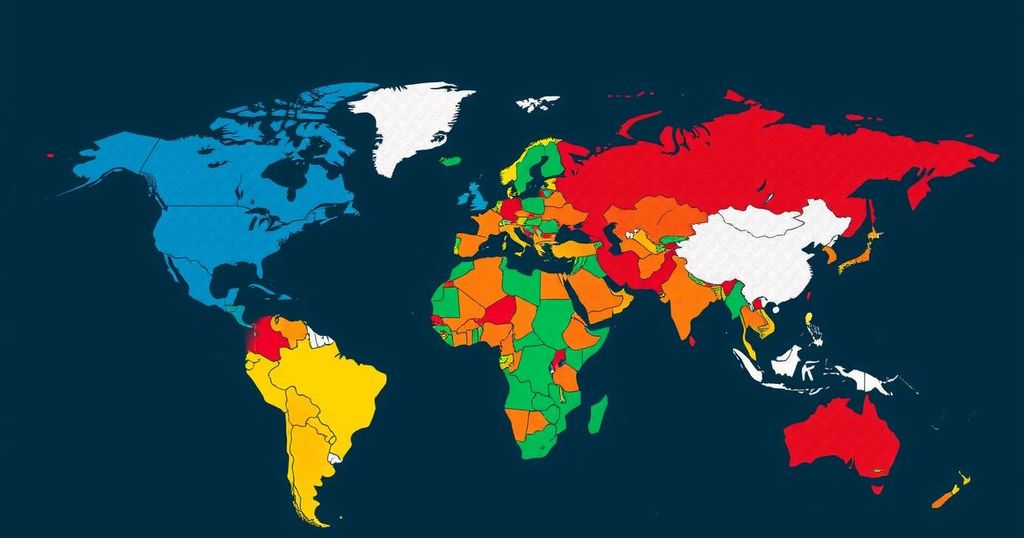The International Court of Justice is hearing arguments that a few countries should be held legally accountable for climate change impacts. Vulnerable nations, particularly Pacific islands, assert that major emitters face minimal consequences and have historically contributed most to greenhouse gas emissions. The court’s forthcoming advisory opinion could reshape international obligations related to climate change and reparations.
During a momentous session at the International Court of Justice (ICJ) in The Hague, representatives from vulnerable nations argued for the legal accountability of a select group of countries that have significantly contributed to climate change. Ralph Regenvanu, Vanuatu’s special envoy on climate issues, indicated that a small number of states are primarily responsible for greenhouse gas emissions while facing minimal repercussions from their actions. He emphasized that Pacific island nations are already suffering from rising sea levels and severe climatic events, stating, “We find ourselves on the frontlines of a crisis we did not create.”
This historic hearing is the result of extensive advocacy led by Vanuatu, including a UN Assembly resolution in March of the previous year calling for an advisory opinion regarding state responsibilities in addressing climate change impacts. Over the subsequent weeks, the court will deliberate on testimonies from 98 nations, scrutinizing the contributions of major emitters such as the United States and China, as well as nations with minimal emissions that nonetheless confront the looming threats of climate change.
Mr. Regenvanu presented alarming statistics indicating that emissions have surged by over 50% since 1990, despite persistent warnings from the scientific community. Ilan Kiloe, legal counsel for the Melanesian Spearhead Group, underscored the dire situation for the populations of his region, asserting that many are at risk of extinction due to the climate crisis.
Margaretha Wewerinke-Singh, chief counsel for Vanuatu, articulated that some states have violated international law through actions such as permitting fossil fuel exploitation and neglecting to adequately regulate emissions. She asserted the obligation of responsible nations to fully compensate for the damage they have caused, emphasizing that reparations must reflect their historical contributions to the climate issue.
Cynthia Houniuhi, representing Pacific Island Students Fighting Climate Change, conveyed her disappointment that the Paris Agreement, initially seen as a beacon of hope, has been undermined by fossil fuel interests. The hearing is part of a broader inquiry that includes insights from organizations like OPEC and the World Health Organization into states’ obligations under international law pertaining to climate change.
The ICJ’s advisory opinions, while non-binding, hold significant potential to influence future climate litigation and policy negotiations, as demonstrated by relevant rulings from similar courts. The hearings were inaugurated with a ceremonial event featuring various political speeches and cultural performances. Houniuhi concluded with a powerful reminder of the urgent need for legal accountability, stating, “As judges, you possess the power to course-correct and renew hope in humanity’s ability to address the greatest challenge of our time.”
The International Court of Justice (ICJ) is deliberating on climate change responsibilities amid increasing global awareness of the existential threat posed by environmental degradation. Pacific island nations, such as Vanuatu, argue that a limited number of industrialized nations, which have historically contributed to substantial greenhouse gas emissions, must be held accountable for their impacts on vulnerable populations. The hearings follow a UN resolution calling for clarity on international obligations regarding climate action, highlighting the ongoing struggle of nations disproportionately affected by climate change despite having minimal roles in its causation.
In summary, the ongoing ICJ hearings represent a critical moment in the quest for accountability related to the climate crisis. Pacific island nations, notably Vanuatu, have made a compelling case for the legal responsibility of major greenhouse gas emitters, asserting that they must face consequences commensurate with their contributions to environmental harm. The outcome may significantly influence international climate policy and future legal interpretations concerning state obligations in combating climate change.
Original Source: www.theguardian.com







